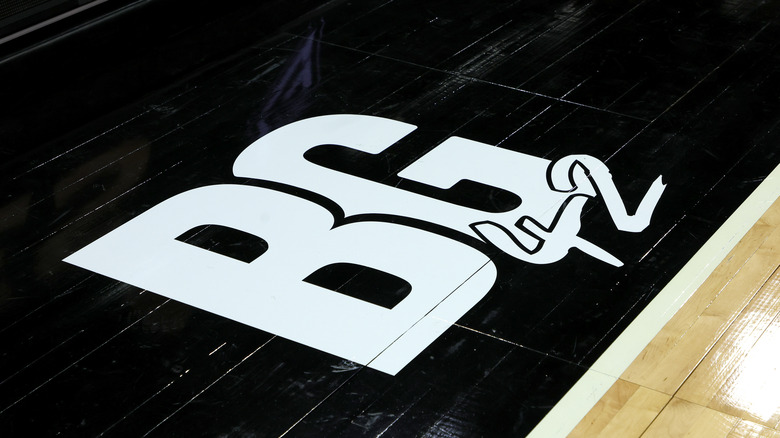What Brittney Griner's 'Wrongfully Detained' Status In Russia Really Means
In February, WNBA star Brittney Griner was taken into custody by Russian officials after she was accused of having drugs in her luggage. According to The New York Times, the 31-year-old faces a sentence of up to 10 years in prison if convicted. Her detainment comes at the same time that Russia has drawn widespread condemnation for invading neighboring Ukraine, and there have been calls for her release. In May 2022, the United States Government officially reclassified Griner as being "wrongfully detained" by Russian officials.
"The welfare and safety of U.S. citizens abroad is among the highest priorities of the U.S government," the State Department said in a statement, according to ESPN. "The Department of State has determined that the Russian Federation has wrongfully detained U.S. citizen Brittney Griner ... The U.S. government will continue to undertake efforts to provide appropriate support to Ms. Griner."
Until Griner was given a wrongfully detained designation, officials focused on making sure that she had access to American officials while in Russian custody. Griner's new designation also means that her case has been transferred to the U.S. State Department's Office of the Special Presidential Envoy for Hostage Affairs, per the Associated Press.
Why was Brittney Griner detained in the first place?
Brittney Griner has been one of the biggest names in women's basketball since her breakout years in college with the Baylor Bears, years that included an NCAA national championship, according to the WNBA. Despite being one of the headliners of the preeminent women's basketball league in the United States, Griner — and many other WNBA regulars — play abroad during the league's off-season. This is why Griner was in Russia in the first place; to play for the Russian squad UMMC Ekaterinburg.
Griner was passing through a Moscow area airport when officials claimed to have discovered vape cartridges in her luggage that contained hashish oil. According to ESPN, no formal charges have been filed against Griner, though officials alleged that she had brought the cartridges into the country illegally.
Before word came out that Griner was being held by Russian authorities, U.S. officials were initially mum on Griner's identity. Early on, Secretary of State Antony Blinken noted the need for privacy in matters like this, but that the government was doing what it could to help. "There's only so much I can say given the privacy considerations at this point," Blinken said, as NPR reported. "Whenever an American is detained anywhere in the world, we, of course, stand ready to provide every possible assistance, and that includes in Russia."
What does wrongfully detained mean?
While the literal definition is easy to decipher, it's worth noting that "wrongfully detained" is a State Department designation, so for Griner's case to be labeled as such, it had to meet certain criteria. According to The New York Times, the United States Congress passed a law that defined the 11 criteria deemed necessary to classify someone as wrongfully detained. These criteria include credible evidence pointing to the detainee's innocence or the likelihood that the United States will have to take diplomatic measures to assist in the situation.
Only one of these criteria needs to be met, and it would appear that Griner's case fits several. The Secretary of State is required to give this designation a thumbs-up, at which point the case is handed over to the State Department's special envoy for hostage affairs. Only a month before Griner was officially designated as wrongfully detained, the same office orchestrated the release of Trevor Reed, a United States citizen and former Marine who had also been detained by Russian authorities. His release was completed by way of a prisoner release, according to CNN, with Russian Konstantin Yaroshenko going the other way.
Griner's new designation marked a change in how the US handles her case
Given that Griner was initially detained just days before Russia's invasion of Ukraine, bringing the basketball star home was set against a particular prickly political backdrop. The U.S. government's initial playbook for helping Griner involved utilizing so-called "quiet diplomacy" to prevent her situation from becoming over-politicized given what was happening around the world at the time.
According a March 11 report by The New York Times, the diplomatic minefield the Biden administration and State Department have to navigate in ensuring Griner's freedom was noted by Representative Colin Allred, a Democrat from Griner's home state of Texas. "It is an extremely sensitive situation. What we're trying to do now, of course, is be helpful and not do anything that'll place Brittney in any kind of danger or make her situation worse."
In the early stages of Griner's detainment, many of her friends, family, and government officials shied away from talking too much about her situation, aside from messages of support (via The New York Times). Similar statements were also issued by the WNBA, and her team, the Phoenix Mercury.
Griner's pretrial detainment was extended days after her wrongful detainment status was announced
Brittney Griner had been scheduled to appear in a Russian courtroom for a hearing on May 19 when she was granted wrongful detainment status by the U.S. State Department. However, just over a week after that announcement, Russian officials announced that Griner's pretrial detention was going to be extended another month, until June 19, per CNN. She had previously been handed another extension back in March.
While it may seem that this could have been a reaction to the State Department's designation, according to a WNBA spokesperson, the extension "was not unexpected," before reiterating the league's vow to make sure that Griner returns to the United States safely. Ned Price, a spokesman for the State Department, said after the second extension was announced that officials had been able to speak with Griner and that she "is doing as well as can be expected in these circumstances," per the Associated Press.
What is the time frame for Griner's release?
As for the timing of Griner's release, unfortunately, that is a complete unknown at the moment. The details of similar cases are sometimes kept under wraps, but the ones where the details are public knowledge seem to indicate that this type of thing can drag out for quite some time. The average case tends to take as long as four years, Cynthia Loertscher, director of research at the nonprofit James W. Foley Legacy Foundation, told The New York Times. That organization's namesake, James W. Foley, was kidnapped by the Islamic State in 2014.
Griner is not the only American currently detained by Russia, according to The Guardian. While Trevor Reed was released via a prisoner swap after being detained on assault charges, his fellow ex-Marine, Paul Whelan, is still in Russian custody after being charged with espionage in 2020. Whelan, a corporate security executive from Michigan, is currently serving a 16-year prison sentence (per Associated Press).





